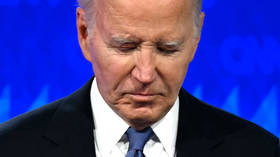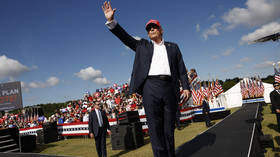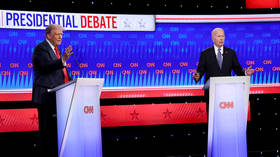The US president is now officially a wizard-king
The recent decision on presidential immunity by the SCOTUS is more than just a victory for Donald Trump
The Supreme Court of the United States (SCOTUS) has handed down a decision in a case brought by the former and likely future President Donald Trump. It marked a victory for Trump because the court has mostly followed his legal team and recognized – or created – a practically impregnable wall of legal immunity around him. Or to be precise, around Trump’s actions during his time as the 45th American president between January 2017 and January 2021. This will serve to shield him from accusations pending in a lower, federal court, that he effectively tried to stage a quiet coup when voted out of office in November 2020, which peaked with a mob storming the Capitol on January 6, 2021.
The immediate fallout of SCOTUS coming down on the side of Trump and his ongoing and thriving campaign to recapture the presidency is obvious. At the very least, the court’s decision has delayed the attempt to prosecute the former president for his response to losing the 2020 election. And, in this situation, stalling is very likely to be the same as stopping. If Trump wins, as is likely, he will snuff out whatever remains of the case against him. His main interest is that no conviction can be reached before the election, and that is now certain.
Apart from these direct effects, everyone agrees that this is a decision of lasting, even historic significance. Beyond that, however, disagreement prevails. Not just disagreement but, as so often is the case in the US now, fierce antagonism, with two sides of America facing each other in absolute distrust and even contempt.
Take for instance the reaction on Bannon’s War Room, the YouTube channel run by Steve Bannon, the longstanding media impresario of far-right populism, former Trump adviser, and currently would-be ideologue-in-chief of a “Christian nationalism” grassroots movement that he promises will make Trump look moderate.
On Bannon’s show, the SCOTUS verdict was hailed as saving the office of president and therefore the whole country from “destruction.” President Joe Biden and his Democratic Party, meanwhile, were denounced for “weaponizing” and “politicizing” the Justice Department, and, more broadly, the law by engaging in “lawfare,” that is, the systematic abuse of legal prosecution to harm or eliminate their political opponent Donald Trump.
If Bannon marks one ideological pole, the other extreme is reliably embodied by Rachel Maddow, a favorite ideologue of extreme centrism who has never come clean about her relentless pushing of the discredited “Russiagate” hoax (according to which Trump won and Hillary Clinton lost in 2016 due to big, bad Russia). Speaking on MSNBC (a channel some Americans call “Red Army TV”), Maddow lamented what she called a “death squad ruling.” By this, she meant that it allows presidents to commit any crime whatsoever, including murdering the opposition.
Take-away point number one: SCOTUS has certainly not helped to lower the political temperature in an already badly polarized country. Instead, the court itself ended up split, with six pro-Republican judges (three of them appointed by Trump) overruling three pro-Democratic ones. Not even America’s highest court, staffed by its, presumably, most sophisticated and responsible jurists and aspiring or pretending to be guided by the constitution – not personal ideological preferences – could find its way to anything better than hardheaded, naked partisanship.
Of course, in principle, things can be biased but still smart. This verdict is no such thing. The substance of the ruling is, to say the least, intellectually puzzling. Its key approach is not complicated. It distinguishes two kinds of actions that a president can undertake: official and unofficial.
Regarding official acts – meaning the president doing his job – the court has divided them into two types. First, “actions within his conclusive and preclusive constitutional authority.” This is a fancy way of saying “everything the constitution says presidents and only presidents can do” or, put differently, pertaining to his “core constitutional powers.” Second, other official acts, which are defined as located on “the outer perimeter of his official responsibility.”
For presidential actions involving “core constitutional powers,” SCOTUS has granted the president lifelong (in and after office) and absolute immunity. For other acts that are official as well but don’t fall under these “core constitutional powers,” the court has not entirely excluded criminal prosecution but made it as difficult as possible by giving the president “presumptive immunity.”
Only “unofficial acts,” that is, in essence, private things, are clearly not immune from criminal prosecution. If a president were to murder his wife or husband in a fit of jealousy, that would still be a prosecutable crime (if, of course that president were stupid enough to get caught).
It gets intriguing when we turn to what SCOTUS means by “official acts.” The principle is simple (if misguided), but the application will be a nightmare. As the court itself has acknowledged, distinguishing official from unofficial actions is crucial. But, trying to secure a “vigorous” and “energetic” president, who is not too distracted or concerned about legal consequences to take decisive action, SCOTUS has also been explicit that “in dividing official from unofficial conduct, courts may not inquire into the president’s motives.”
If that is so, then the only way to make that key distinction in practice is by purely formalistic criteria. For instance, as immediately applied by the court itself, Trump has absolute immunity for all his interactions with the Justice Department, simply because, in essence, every president has power over that department. But it was in his interactions with the Justice Department that he stands – with good evidence – accused of having tried to abuse his powers to undo an election result.
The fallacy is obvious. It is precisely in areas that are within a president’s official powers that a president bent on abusing those powers will – one hesitates to spell out such a banality – abuse his powers. And yet that is exactly the domain of action that SCOTUS has now declared not only absolutely immune to prosecution but also sealed off even from legal inquiry into a president’s motives.
This is an obviously absurd position. It contradicts not merely common sense (that happens often enough in jurisprudence) but fundamental reason. What SCOTUS has come up with is a barely secular version of papal infallibility. That dogma – historically quite young as well – does not, after all, claim that the Roman Catholic Pope is always right, but that he can be nothing but right when speaking ex cathedra, that is, in modern American English “officially” or, as it were, involving the pope’s “conclusive and preclusive authority” as derived from “founding father” Peter.
Put differently, if we think in terms of American political culture and perhaps culture more broadly (in an ethnographic sense), the US president has now emerged as not only sacrosanct but a living mystery, the US Constitution as a text with de facto magical powers that can rearrange the very structure of reality (so much for fundamentalism), and the Supreme Court as a priesthood with a monopoly on interpreting the precise effects of that magic.
Americans are right to worry about the clear authoritarian potential of this SCOTUS decision. But, frankly, that’s so obvious, it’s a bit of a no-brainer. What is more interesting and even more disturbing is the sheer hubris and also intellectual shamelessness that went into such a clearly reason-defying verdict. Yet that underlying feature is not a matter of right and left in the US, but a deep, systemic, and pervasive flaw. Many of the same media surrogates of the Democratic Party up in arms about Trump getting away with possible crimes have no problem with Biden getting away with co-perpetrating a genocide in obvious, breathtaking defiance of international law or even with his bizarre attempt to pretend he is fit for office. Angry about the Trumpists and their SCOTUS allies bending reality and trampling all over logic? Look in the mirror.
The statements, views and opinions expressed in this column are solely those of the author and do not necessarily represent those of RT.








Comments are closed.